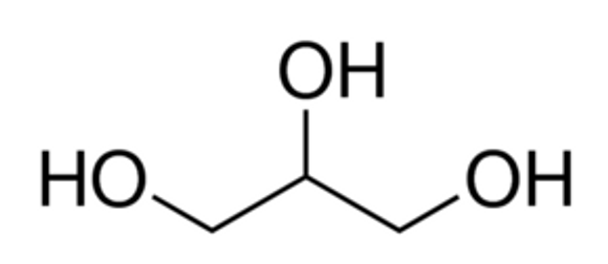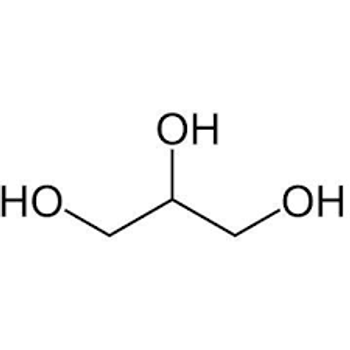Description
Glycerol ≥99.5%, 500 ML
Synonym: 1,2,3-Propanetriol, Glycerin
-
CAS Number 56-81-5
-
Linear Formula HOCH2CH(OH)CH2OH
-
Molecular Weight 92.09
-
Beilstein/REAXYS Number 635685
-
EC Number 200-289-5
-
MDL number MFCD00004722
-
PubChem Substance ID 24895360

-
NACRES NA.21
Properties
| Related Categories | Aliphatic Compounds, Biochemicals and Reagents, Biostabilization Agents, Carbohydrates, Carbohydrates A to Z, Carbohydrates G, Cell Biology, Core Bioreagents, Density Gradient Media and Cell Separation, Hematology and Histology, Monosaccharide, Nutrition Research, Phytochemicals by Chemical Classification, Polyhydric alcohols, Research Essentials, Stabilization of Biomolecules Less... |
| Quality Level | 200 |
| vapor density | 3.1 (vs air) |
| vapor pressure | <1 mmHg ( 20 °C) |
| assay | ≥99.5% |
| autoignition temp. | 698 °F |
| impurities | ≤0.10% Water (Karl Fischer) |
| refractive index | n20/D 1.474 (lit.) |
| bp | 182 °C/20 mmHg (lit.) |
| mp | 20 °C (lit.) |
| density | 1.25 g/mL (lit.) |
| cation traces | heavy metals (as Pb): ≤5 ppm |
| λ | 1 cm path |
| UV absorption | λ: 205 nm Amax: 1.0 |
| - | λ: 225 nm Amax: 0.10 |
| - | λ: 280 nm Amax: 0.05 |
| - | λ: 320 nm Amax: 0.02 |
| - | λ: 340 nm Amax: 0.01 |
| - | λ: 400 nm Amax: 0.01 |
| suitability | suitable for component for culture media |
| SMILES string | OCC(O)CO |
| InChI | 1S/C3H8O3/c4-1-3(6)2-5/h3-6H,1-2H2 |
| InChI key | PEDCQBHIVMGVHV-UHFFFAOYSA-N |
General description
Glycerol is odourless, colorless, viscous in nature, and exists as a sweet tasting liquid. It can be derived naturally as well as from petrochemical feedstock. Glycerol has a wide variety of applications, and is one of the most valuable and versatile chemical substances in nature. It can be used as an emollient, solvent, sweetening agent, in pharmaceutical formulations, cosmetics, foodstuffs and toiletries. It is very stable and can be easily stored under normal temperature; also it is non-irritating and has no adverse impact to the environment.
Application
Glycerol is used both in sample preparation and gel formation for polyacrylamide gel electrophoresis. Glycerol (5-10%) increases the density of a sample so that the sample will layer at the bottom of a gel′s sample well. Glycerol is also used to aid in casting gradient gels and as a protein stabilizer and storage buffer component.
Glycerol is used both in sample preparation and gel formation for polyacrylamide gel electrophoresis. Glycerol (5-10%) increases the density of a sample so that the sample will layer at the bottom of a gel’s sample well. Glycerol is also used to aid in casting gradient gels and as a protein stabilizer and storage buffer component.
Packaging
1 L in poly bottle
100, 500 mL in poly bottle
Biochem/physiol Actions
Glycerol is hygroscopic in nature and is soluble in water owing to its three hydrophilic alcoholic hydroxyl groups. It can form both inter- and intramolecular hydrogen bonds, making it a very flexible molecule. The physiologic effect of glycerine is due to cell-mediated immunity, increased IgG production and increased histamine release.





